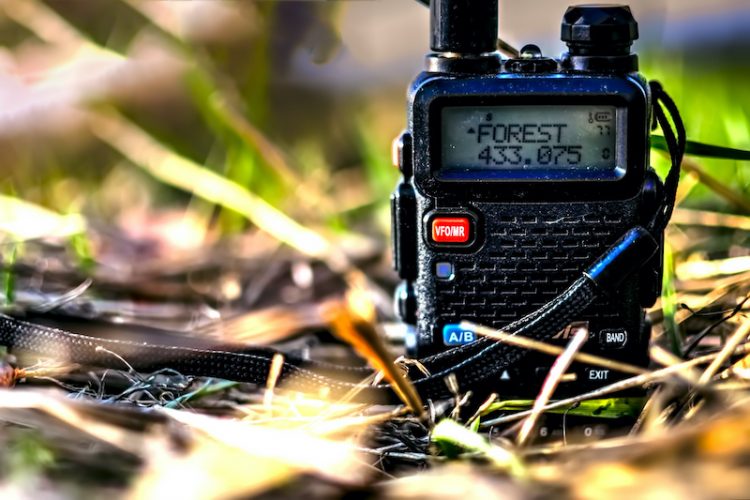If you are looking for a radio that can communicate over short distances, then you will either be looking at a CB radio or a VHF radio. The latter is more commonly known as a walkie talkie. So, which one is the best option for you? That is what we are going to take a look at when we pit CB radio vs VHF.
Why not use a cellphone instead? Let’s address that first.
We know that cellphones are immensely popular now. It is a great way to keep in touch with somebody. However, cellphones do have limitations that you will:

- Not be able to communicate with somebody unless you know their number.
- Only be able to talk to only one person at a time.
- Need to have cellphone coverage
Whether you opt for a CB radio or VHF radio, you don’t have any of these worries. They are going to work, even if you have no cellphone coverage at all. This is because they both operate using radio waves, albeit in a slightly different way.
A CB Radio Will Offer You Greater Coverage
If the distance of your communications is important to you, then you will need to opt for a CB radio. The range of the two types of devices isn’t even close.
If you opt for a VHF radio, then you are going to get a maximum range of about 2-miles. If you go for a CB radio, then this is going to be about 20-miles.
Due to how a two way radio works, the output signal is usually going to be a lot weaker than a CB radio. This means that it is rare that you will ever be able to get the full advertised range on it. In fact, it is more likely that you will get a mile at the most. There is just too much interference in most areas.
Professional VHF Radios Need a License
In many areas, you will need to obtain a license in order to operate a higher-powered VHF radio (i.e. the ones with the bigger ranges). It is likely that the license is only going to apply to a very specific area too. This means that while VHF radios are a lot more portable, you will probably not be able to go traveling with one. Not unless you want to apply for a ton of different licenses.
On the other hand, there is no license required for CB radios now. At least in the United States. You can just buy one and wherever you want in the country. For ‘on the road’ usage, a CB radio is always going to be a lot better.
VHF Radios Will Often Have Better Sound Quality
Even without a 2 way radio repeater setup, the way in which VHF radios operate, and the frequency they run on, will likely have better audio quality than a CB radio.. However, if you are operating a VHF radio at the maximum possible range, it is likely that the audio quality will be no better than that of a CB radio.
That being said, because VHF radios operate at a similar frequency to police and other emergency service broadcasts, it is more likely that they will be prone to interference. This means that if you are in a busy town or city, the sound quality through your VHF radio could plummet.
VHF Radios Are More Private
With most VHF radios, you will need to pair yourself with another VHF radio before your conversations can be synced up. This isn’t the case for all of them, but it certainly applies to most.
Of course, this means that your conversations are going to be a lot more private. If you are on a CB radio station, then anybody else tuned into that CB radio station can hear your conversations.
VHF Radios Are More Portable
A VHF radio is going to be a lot more portable. In fact, it is built to be portable. It is a handheld unit.
Yes. You can pick up a CB radio that is portable and that you can carry around just like a VHF, but it is going to be nowhere near as effective. If you are ‘out and about’ in the forest or by a lake, then a VHF radio is probably always going to be your safest bet.
That being said, if you are in a car or other vehicle, then a CB radio is going to be a far safer bet. You don’t have to worry about the interference quite as much, or with other people dropping ever so slightly out of range which could result in lost transmissions.
CB Radios Allow You to Talk to More People
Weighing out a VHF radio vs a CB for your RV? How about your boat? They’re not just for recreation of course. Anybody who is tuned into a CB radio station within range will be able to hear you. This is why the option is so great for truckers. You will often be falling in and out of range of different people, and CB radio ensures that you will always be able to communicate with them. It is no hassle.

If you have a VHF radio, only people who are tuned into the digital VHF radio communication systems will be able to communicate with you. It is difficult, if not impossible, to add people into that network unless you are physically close to each other at some point. Even then, the number of people who can have their radios tied together is fairly limited.
Yes, there are more extensive VHF radios on the market. Some that come closer to CB radio, but there are still going to be small limitations in place on them. They are not really that good for communication outside of a known group.
CB vs VHF Radio for RB Use
Before we compare VHF radio vs CB radio, it is probably worth talking a little bit about why you may want to go down this route for your RV. After all, the majority of people do not have a radio in their vehicle, right?
Well, the main reason is so that you can listen in on radio chatter. There are a lot of people traversing the open road, just like you. Many of them are truckers. This means that they do it on a daily basis. If you are connected up to a radio, you will be able to get the lowdown on happenings on the roads. Any information that you get will come in far quicker than any app you can have installed on your phone.

CB Radio Is More Used
Since you know the reason why you need a radio in your RV, it is reasonable to want the option which has the most traffic chatter, right? Well, that is CB radio.
CB radio is a technology that has been around for a good few decades now. It really caught on when long-distance trucking became a thing. It was an easy-to-use technology that truckers could install in the cabs of their trucks. Obviously, better technologies have been launched since then, but truckers are already committed to CB radios. It is their primary way to communicate, and we don’t see that changing any time soon.
Of course, VHF radio still gets used on the road. It just isn’t that popular. It is typically easier to find someone that knows how to talk on a CB radio than a VHF one.. In the United States, if you turn into Channel 19 while on the road, it is virtually guaranteed that you will find a few truckers talking to one another. If you listen in on that broadcast, then you are going to be finding out so much about the roads you are heading down.
CB Radio Has Better Range
Now, technically when comparing signals between CB vs VHF radios, the later wins by a longshot. This is because the average VHF radio is going to operate at a higher wattage than a CB radio. However, this does not necessarily translate to more range.

Even among the best two way radios, it all comes down to the way in which VHF radio signals work. They try to take a direct route, and often quite low to the ground. They are severely impacted by obstacles. If you are driving on the road, then there will be a lot of obstacles around you in the form of cars. This means that a ton of interference. Head into a major town or city and things will get even worse. The signal will never be that great.
An average CB radio, when set-up correctly, should be able to get a range of about 20-miles. A VHF radio may get a couple of miles on a good day. Yes. There are professional digital VHF radio communication systems which will have 20-mile ranges, but it is rare that you will be able to get anywhere close to that range unless you are in a wide, open space.
Which Option Is Right for You?
Hopefully, by reading the information on this page, you now have a better idea about whether a VHF radio or CB radio is better for you. If you want portability, it is always going to be the VHF route. However, in the battle between a 2 way radio vs CB radio, a 2 way radio is definitely a better suited companion if you’re destined to go exploring around the country.



